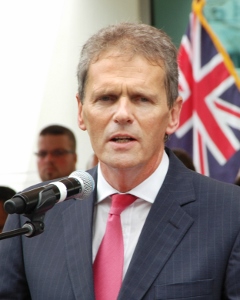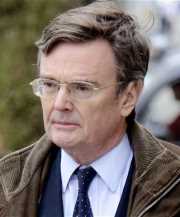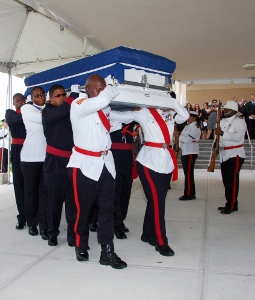Archive for June, 2013

Governor commends voters on election involvement
 (CNS): The governor has applauded the Cayman people for their participation in the democratic process during the General Election last month. Speaking at the swearing in ceremony last week, he offered his thanks to everyone involved in the election and described it as disciplined and dignified. He took a lot of comfort, he said, from the findings of the observer mission that had been invited to Cayman for the first time to monitor an election, which found that the national ballot met international standards. Duncan Taylor said he was looking forward to working with the new government for the last few months that he remains in the Cayman Islands before he moves to Mexico.
(CNS): The governor has applauded the Cayman people for their participation in the democratic process during the General Election last month. Speaking at the swearing in ceremony last week, he offered his thanks to everyone involved in the election and described it as disciplined and dignified. He took a lot of comfort, he said, from the findings of the observer mission that had been invited to Cayman for the first time to monitor an election, which found that the national ballot met international standards. Duncan Taylor said he was looking forward to working with the new government for the last few months that he remains in the Cayman Islands before he moves to Mexico.
With 18 members and only 18,300 voters, this has led to a strong sense of engagement in the election process as all voters and MLAs have strong ties and much closer relationships with each other than is common in larger jurisdictions, Taylor said, as he congratulated everyone for what was, by and large, a well conducted dignified campaign.
Taylor said that an election is an exciting and dynamic moment as he congratulated the new government.
“I know that I can say with confidence that my successor, when they come out here, can look forward to a three or four year appointment here in the Cayman Islands and working constructively and cooperatively with the members of the Legislative Assembly and the government in the spirit of partnership set out in the white paper published by the UK government last year,” he said.
Having had a tumultuous relationship with the former premier, all eyes of the gathered audience were on the moment when Taylor and McKeeva Bush came face to face at the swearing in ceremony. However, following a brief handshake and Bush’s decision to use his own pen rather than the one offered by the governor, there was little evidence of the major friction between the two men as Bush was sworn in as leader of the opposition.

Peer calls for end of Cayman parliamentary group
 (CNS): A senior Lib Dem peer has called for an end to the British parliamentary group whose stated purpose is to further the interests of the Cayman Islands. Lord Oakeshott (left) told Radio 4's Today programme this morning, "Look at the Cayman Islands all-party group. Just see what this is all about. Just see who is running that and paying for that. That is not an appropriate way for Parliament to be used … in many cases these are front organisations for commercial interests. Close down the APG on the Cayman Islands and make them pay their tax." The UK media spot light is currently on APGs after MP Patrick Mercer was secretly filmed boasting to undercover journalists posing as business contacts that he could get a group of "free-loaders" to join an APG on Fiji.
(CNS): A senior Lib Dem peer has called for an end to the British parliamentary group whose stated purpose is to further the interests of the Cayman Islands. Lord Oakeshott (left) told Radio 4's Today programme this morning, "Look at the Cayman Islands all-party group. Just see what this is all about. Just see who is running that and paying for that. That is not an appropriate way for Parliament to be used … in many cases these are front organisations for commercial interests. Close down the APG on the Cayman Islands and make them pay their tax." The UK media spot light is currently on APGs after MP Patrick Mercer was secretly filmed boasting to undercover journalists posing as business contacts that he could get a group of "free-loaders" to join an APG on Fiji.
The Sunday Times has also filmed three peers appearing to offer to be paid lobbyists for a fictitious firm. They told reporters an all-party parliamentary group could be set up as a lobbying vehicle for a fake South Korean solar energy company.
There is no suggestion of any wrong-doing by any members of the Cayman Islands group, which has its secretariat supplied by the Cayman Islands government and last met on 9 July 2012.
Amid the sleaze allegations, Lord Oakeshott, speaking on Radio 4, rubbished Nick Clegg's plans for cleaning up the UK parliament with a lobbyists' charter, comparing it to tackling malaria by spraying a bit of "disinfectant" around mosquitoes. "We have to clean out the stinking swamp which is particularly the House of Lords where there is the nasty whiff of dirty money the whole time," he said.
He also told the BBC that ordinary people “would be sickened by the sort of behaviour that goes on” in parliament, particularly in the House of Lords.
All-Party Parliamentary Group for the Cayman Islands
Related articles:
MP Patrick Mercer 'offered Commons security pass' (BBC 1 June 2013)
Lord Oakeshott urges radical reform of House of Lords (BBC 3 June 2013)
Close down Cayman Islands' access to Parliament, says peer (The Week 3 June 2013)
UK Lord says he has ‘mini ambassadorial’ role (CNS 9 April 2013)

Cabinet working on ministries
 (CNS): With the increase from five to seven Cabinet members, the new government now has the task of realigning the responsibility of various ministries, departments and government entities across its new seven ministers. Although the newly sworn in premier has already divided the broad responsibilities among his new team, Alden McLaughlin said recently it could take a few more weeks before all of the various subjects are allocated to the new ministries. This also means that several civil servants will be reassigned to new departments, and as the new ministries take shape, there is also likely to be a change in the management line-up.
(CNS): With the increase from five to seven Cabinet members, the new government now has the task of realigning the responsibility of various ministries, departments and government entities across its new seven ministers. Although the newly sworn in premier has already divided the broad responsibilities among his new team, Alden McLaughlin said recently it could take a few more weeks before all of the various subjects are allocated to the new ministries. This also means that several civil servants will be reassigned to new departments, and as the new ministries take shape, there is also likely to be a change in the management line-up.
At present, there are still several government departments that have not been officially allocated to one of the new Cabinet ministers and Alden McLaughlin’s own new ministry of public affairs has yet to be defined. Although the goal is to off-load some of the responsibility for public safety, law enforcement, prisons and border control to an elected official, it is not yet clear how much responsibility will be taken from the Portfolio of Internal Affairs and given to the new premier.
McLaughlin has also said he intends to take more of a coordinating role for leading the Cabinet rather than take on an excessive number of portfolios, as both his predecessors opted to do. Aside from his new ministry, he will have more oversight of the entire Cabinet rather than leaving ministers to operate in their own silos, as happened in the past.
With a much larger government front bench, as the ministries take shape there is also likely to be a shake-up of the top government civil servants. Despite the a-political role that all civil servants from the top to the bottom are expected to take, the close working relationships between ministers and their chief officers can often lead to questions of loyalty once a new government takes over.
When McKeeva Bush took over as premier in 2009, several chief officers were moved and three found themselves without a ministry, two of whom are understood to still be on the payroll. Although Bush denied that he had a hand in their removal, two of the women had worked very closely with Alden McLaughlin when he was minister for education and had responsibility for financial services.
Angela Martins, Deborah Drumond and Diana Montoya were all ousted from their top jobs when the UDP took office, and although Martins was understood to have accepted a pay-off and left the service, there has been no official update on the status of Drummond and Montoya. They were confirmed to still be on the payroll at the end of 2012.
With the impending reshuffle and expansion of the ministries and portfolios ahead, this may be an opportunity for those two women to return to a senior government post.
However, although there are two new ministries, former premier Bush had three chief officers in his ministry, so even with the reshuffle there may still be more chief officers available then posts. The new government must realign senior officers to fit the relevant departments while at the same time keep an eye on costs and the campaign promise to increase efficiency and cut waste.

Blasting plans raise concern
 (CNS): Residents in the South Sound area are once again raising environmental concerns about development in the area, having learned that blasting that is set to take place to create inland lakes as part of a new residential project. Residents in the old Crewe Road area have been informed in a letter from a company called Apec Consultants that the developers of the project, RC Estates, had instructed them to do a structural survey of homes in the area in preparation for the blasting. Having received no notice from any government authorities about the proposal and with no details on where or how deep the blasting would be or what mitigation would be employed to protect the properties affected, residents are concerned about their homes as well as the environmental impact to the community.
(CNS): Residents in the South Sound area are once again raising environmental concerns about development in the area, having learned that blasting that is set to take place to create inland lakes as part of a new residential project. Residents in the old Crewe Road area have been informed in a letter from a company called Apec Consultants that the developers of the project, RC Estates, had instructed them to do a structural survey of homes in the area in preparation for the blasting. Having received no notice from any government authorities about the proposal and with no details on where or how deep the blasting would be or what mitigation would be employed to protect the properties affected, residents are concerned about their homes as well as the environmental impact to the community.
One resident told CNS that the report they received from Apec was simply a summary of a number of cracks around their property, with no indications of what that meant or what precautions would be taken to prevent any dynamic effects the blasting may have on their home. As a result, the resident hired an independent surveyor to provide advice as tothe possible ramifications the blasting might have on their home and were warned that the anticipated blasting, depending on the proximity and other variants, could have a compromising effect on the existing house foundation and the walls.
The potential blasting relates to the adapted Emerald Sound project, which has caused controversy for several years now in the neighbourhood, with objections to the original plans to dredge canals from the site to the ocean and move the road, and to the reclamation of land on the ocean front part of the development in the residential seaside community. While the Emerald Sound project is under appeal, the developer has moved on to alternative plans for the land and now wishes to develop a subdivision with two very deep lakes.
Although the residents in the area are in agreement that this project is a more acceptable alternative to the original Emerald Sound proposal, the depth of lakes and the continued proposal to relocate the South Sound Road, which has been tentatively approved by the Central Planning Authority, is still raising concerns and the blasting of the lakes has also raised a number of issues.
Residents in the area continue to oppose the road move, which still requires National Roads Authority approval, and as the primary proposal for the Emerald Sound project is still under appeal, residents believe the altered Adagio Plan should not be approved yet.
Government departments, including the planning department, the Water Authority and the Department of Environment, have all objected to the depths of the proposed lakes, which are set to be 35 feet, for various reasons, which were recorded at recent planning meeting. They had recommended limiting the lake depths to the standard 14 to 20 feet. The CPA had approved the application with lake depths to 30 feet but had originally imposed the condition that fill could not be moved offsite to prevent the sub-division plan becoming a quarry.
However, an application has been made by the developers to have that condition removed, which will lead to the creation of a quarry in the heart of the residential community. Residents are hoping that, at the very least, they can still get the depths of the lakes reduced and have the developer take precautions before they start blasting to protect all of the properties which may be at risk.
See details and concerns set out in Planning meeting from 29 February last year here on pages 10-34.

Webb’s anti-racism policy gets nod from FIFA
 CNS): FIFA Member Associations have approved the anti-racism and discrimination resolutions proposed by the governing body’s newly-formed task force, chaired by FIFA Vice President Jeffrey Webb, during its 63rd Congress held in Mauritius on Friday. Speaking at the conference, Webb said he wanted this to be the defining moment when football stood up against racism and discrimination. “Let us all show the world that the football family is committed to continuing its evolution into an anti-discrimination, multi-cultural organization that promotes positive role models to society,” he said.
CNS): FIFA Member Associations have approved the anti-racism and discrimination resolutions proposed by the governing body’s newly-formed task force, chaired by FIFA Vice President Jeffrey Webb, during its 63rd Congress held in Mauritius on Friday. Speaking at the conference, Webb said he wanted this to be the defining moment when football stood up against racism and discrimination. “Let us all show the world that the football family is committed to continuing its evolution into an anti-discrimination, multi-cultural organization that promotes positive role models to society,” he said.
With the objective to constantly improve the game and promote the values associated with the sport, the federations have agreed to adopt and implement the proposed resolutions throughout the world, in every region and every country where football is played, which will bring universality to the mechanisms that combat racism and discrimination.
FIFA President, Joseph Blatter stressed the importance of the fight against discrimination. "There have been despicable events this year that have cast a long shadow over football and the rest of society," he said. "I am speaking of the politics of hate – racism, ignorance, discrimination, intolerance, small-minded prejudice.”
He also expressed a hope that, through “the newly formed Task Force, led by Jeffrey Webb, and the tough resolution before you this week, we can send a strong signal to the racists that their time is up. The ball does not discriminate and neither should we.”
Adding to FIFA’s robust regulatory framework and Code of Conduct, the task force will support the governing body in applying its zero tolerance policy and strengthening its long-standing fight against discrimination worldwide. It will also remind the member associations about their obligation to apply the sanctions provided for in the FIFA Statutes and the FIFA Disciplinary Code as part of their responsibility to eliminate racism and discrimination in football within their jurisdiction.
“We, as a family, have met various challenges over this long journey to expand the passion for football throughout the world, which started 108 years ago,” Webb told the audience. “In 1976, the football family stood together and took action against apartheid. Likewise, the 1986 Congress in Mexico has gone down in history as a decisive moment for the world governing body to take a stance against women’s inequality within football.”
The following measures shall be implemented on a global level in football:
EDUCATION: competition organizers shall establish a concrete action plan, showing their intention to fight all forms of racism and discrimination among their players, officials and supporters.
PREVENTION: Competition regulation shall foresee a specialized official to be in the stadium to identify potential acts of racism or discrimination with the aim of easing the pressure on referees and facilitating the availability of evidence for the judicial bodies to take decision.
SANCTIONS: The sanctions provided for in the FDC, which are mandatory for all member associations in accordance with the FDC, offer relevant judicial bodies the necessary discretion when deciding on specific cases of supporter misconduct. However, in order to harmonize the pronounced sanctions on a worldwide level, the sanctions imposed on a club or representative team shall in principle be issued in a two-stage approach:
For a first or minor offence, the sanctions of a warning, a fine and/or the playing of a match behind closed doors shall be applied. For re-offenders or for serious incidents, sanctions such as point deductions, expulsion from a competition or relegation shall be applied.
Furthermore, any person (player, official, match official, etc.) who commits such an offence should be suspended for at least five matches combined with a stadium ban as foreseen in the FDC.

Hundreds say farewell to late speaker
 (CNS): Around 1,000 people paid their last respects to the late Edna Moyle, a former speaker of the House, at the official funeral service at the weekend, government officials said. She was laid to rest in North Side on Saturday afternoon following a service held at the Clifton Hunter High School auditorium. Moyle received full official honours, including continuous guarding of the flag-draped casket provided by uniformed officers and a guard of honour by police officers outside, as the casket was carried aloft by senior uniformed officers to the waiting hearse.The funeral service was led by Rev Rohan Forrester and her PPM party colleague, PremierAlden McLaughlin, provided a tribute from the government lauding Moyle’s contributions.
(CNS): Around 1,000 people paid their last respects to the late Edna Moyle, a former speaker of the House, at the official funeral service at the weekend, government officials said. She was laid to rest in North Side on Saturday afternoon following a service held at the Clifton Hunter High School auditorium. Moyle received full official honours, including continuous guarding of the flag-draped casket provided by uniformed officers and a guard of honour by police officers outside, as the casket was carried aloft by senior uniformed officers to the waiting hearse.The funeral service was led by Rev Rohan Forrester and her PPM party colleague, PremierAlden McLaughlin, provided a tribute from the government lauding Moyle’s contributions.
Among the many people who paid tribute, ithe new health minister and a close friend of Moyle, Kurt Tibbetts, said her life was devoted to public service and her family, as he also offered a musical tribute. North Side MLA Ezzard Miller also joined friends and family, who read from scripture and delivered messages and songs.

Gun found in bushes earns CUC linesman 7 years jail
(CNS): A 42-year-old man from Breakers was sentenced to seven years in jail Thursday for possession of an unlicensed firearm. Michael Hugh Powell admitted the offence when he was arrested at his home last November and pleaded guilty in January of this year. Claiming that he found the Longhorn revolver in the bushes in Prospect while at work for CUC, Powell kept the weapon in his house for around two months before it was discovered by police following an operation at his home. Although he argued that he had never intended to use the gun and wanted to hand it in, Justice Charles Quin said he could find no exceptional circumstances in the case and Powell was given the mandatory minimum sentence.
Although Powell, who has worked for CUC since leaving school, has no previous convictions, had admitted his crime from the start and co-operated fully with the authorities, the law required the judge to hand down the lengthy sentence. Even though there was no evidence that Powell had tried to use the gun in a crime, the firearm’s law provides for a mandatory sentence of those found guilty of possessing any unlicensed firearm of ten years after trial or seven years following a guilty plea.
According to Powell’s defence attorney, the discovery of the gun was purely accidental and he had kept the loaded revolver out of stupidity and because he did not want the real owner to know he had handed the weapon over to the police.
In his interview with the police, Powell told the officer that he had found the weapon while at work but he had returned to the spot that night and then took the gun home. “Being stupid and not thinking, I took it home. I wrapped it up in a towel and it was there (under the nightstand) from then.”
Defence attorney Trevor Burke told the judge on behalf of his client that he had made discreet enquiries about handing in the weapon but when he asked for a particular officer, he found that he had left the RCIPS, and in the absence of a gun amnesty at the time, Powell had held on to the weapon to keep it out of the hands of criminals.
Despite the glowing character references and even details of Powell assisting the police to recover drugs and helping a victim after a shooting he had witnessed at a gas station, the judge was not swayed that there were any exceptional circumstances and struggled to understand why Powell had taken and kept the weapon. The judge found that Powell, who was familiar with guns and had previously held a firearms licence, must have been aware that it was a loaded and dangerous illegal weapon.
“The court is at a complete loss as to why the defendant should return to the bushes where he saw the firearm and collect the firearm, and further, why the defendant would keep the firearm in his custody and under his control for so many weeks,” the judge stated in his sentencing ruling. “With the greatest of respect to the defendant’s leading counsel, the submission that the defendant went back to the bushes in the middle of the night to recover the firearm in order to remove it from criminal circulation is implausible,” Justice Quin said, adding that keeping if for up to ten weeks had compounded his “very stupid mistake”.
The judge said the defendant had several options when he found the weapon: he could have shared the discovery with his fellow CUC workers and then called the police or he could have left the scene and called the police confidential hotline or taken it to the station.
He said thegun was not discovered until the police acting on information they had received arrested Powell and searched his home.
Acknowledging the impressive references submitted to the court on Powell’s behalf, the judge said he could not find any exceptional circumstances to depart from the statutory minimum. Justice Quin also noted that the primary intention of the firearm’s law is that sentencing must act as a deterrent to others and not just the individual offender.

CS makes plans to recruit and develop local talent
 (CNS): The latest minutes released by the deputy governor’s office showing a scant record of the regular weekly meeting between the civil service boss, Franz Manderson, and the chief officers on 13 May revealsthat the public sector management was discussing succession planning for Caymanians. They were also given a presentation on 'The Rationalisation of the Public Service". However, the short record of the meeting gives no detail of what was discussed following the presentation and merely indicates the chief officers were asked to provide their comments by 17 May. Details regarding how the management plans to ensure Caymanians are promoted were also absent from the minutes.
(CNS): The latest minutes released by the deputy governor’s office showing a scant record of the regular weekly meeting between the civil service boss, Franz Manderson, and the chief officers on 13 May revealsthat the public sector management was discussing succession planning for Caymanians. They were also given a presentation on 'The Rationalisation of the Public Service". However, the short record of the meeting gives no detail of what was discussed following the presentation and merely indicates the chief officers were asked to provide their comments by 17 May. Details regarding how the management plans to ensure Caymanians are promoted were also absent from the minutes.
The succession plan was described as a workforce planning strategy designed to ensure that the Cayman Islands Government CIG recruits and develops Caymanian talent to fill each key managerial or technical roles within the organisation.
“While succession planning is focused on Caymanians, as a responsible employer, CIG strives to inspire the personal best from all its employees,” is all that is recorded in the minutes.
See minutes posted below.
Related article on CNS:

Costa Rica poachers suspects in ‘turtle activist’ slaying
(BBC): An environmentalist campaigning for the protection of endangered sea turtles in Costa Rica has been found dead in a suspected killing by smugglers. Jairo Mora was reportedly found face down with his hands tied on Moin beach, 105 miles east of the capital, San Jose. Vanessa Lizano, the owner of the turtle sanctuary where Mora worked, said he had been killed because of his work. Sea-turtle eggs are considered a delicacy in some parts of the world. Lizano told the BBC: "Jairo went on patrol with some volunteers and they were attacked by armed men. "It was him they wanted, because he was the one who was always looking after the nests."
Lizano said that poachers in Costa Rica can make up to $300 (£200) per day smuggling turtle eggs in the black market. She said they had received many threats over the years because of their work at the sanctuary.